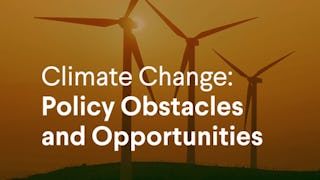Ce cours explore et analyse de manière critique les politiques climatiques historiques et contemporaines (par exemple, le Protocole de Kyoto et l'Accord de Paris). Les questions politiques relatives aux sources d'énergie, telles que l'énergie nucléaire, seront examinées. Le cours se concentre sur la compréhension des principes et des termes clés relatifs au climat qui entourent l'élaboration des politiques, en particulier pour les pays/communautés à faible revenu ou en développement. En outre, ce cours explore les technologies les plus récentes utilisées dans l'analyse du climat.

Profitez d'une croissance illimitée avec un an de Coursera Plus pour 199 $ (régulièrement 399 $). Économisez maintenant.

Politiques et analyse du changement climatique mondial
Ce cours fait partie de Spécialisation Modélisation et prévision des anomalies climatiques

Instructeur : Osita Onyejekwe
Inclus avec
Expérience recommandée
Ce que vous apprendrez
Identifier les objectifs et les politiques en matière de climat, tels que le Protocole de Kyoto et l'Accord de Paris.
Décrire les impacts du changement climatique.
Évaluer les défis technologiques, économiques et politiques associés aux stratégies d'atténuation du changement climatique.
Compétences que vous acquerrez
- Catégorie : Atténuation du changement climatique
- Catégorie : Analyse politique
- Catégorie : Relations internationales
- Catégorie : Gouvernance
- Catégorie : Technologies durables
- Catégorie : Politiques publiques
- Catégorie : Technologies émergentes
- Catégorie : Adaptation au changement climatique
- Catégorie : Environnement
- Catégorie : Science de l'environnement
- Catégorie : Prévisions
- Catégorie : Énergie et services publics
- Catégorie : Politique environnementale
- Catégorie : Prévention de la pollution
Détails à connaître

Ajouter à votre profil LinkedIn
2 devoirs
Découvrez comment les employés des entreprises prestigieuses maîtrisent des compétences recherchées

Élaborez votre expertise du sujet
- Apprenez de nouveaux concepts auprès d'experts du secteur
- Acquérez une compréhension de base d'un sujet ou d'un outil
- Développez des compétences professionnelles avec des projets pratiques
- Obtenez un certificat professionnel partageable

Il y a 4 modules dans ce cours
Dans ce module, vous vous pencherez sur les aspects critiques de la gouvernance énergétique et environnementale, en commençant par une exploration des politiques climatiques mondiales et de leur efficacité. L'accent est ensuite mis sur la compréhension du développement historique et des débats contemporains autour de l'énergie nucléaire en tant qu'alternative aux combustibles fossiles, en examinant ses rôles et défis potentiels. Le module se termine par une exploration des paysages énergétiques futurs, en mettant l'accent sur les sources d'énergie renouvelables et leurs incitations politiques aux États-Unis.
Inclus
3 vidéos8 lectures1 devoir2 évaluations par les pairs2 sujets de discussion
Dans ce module, vous vous lancerez dans une exploration approfondie de l'énergie nucléaire, en commençant par une compréhension fondamentale de ce qu'implique l'énergie nucléaire. Ensuite, vous explorerez les différentes perspectives de l'énergie nucléaire en tant que source d'énergie alternative avant d'examiner les politiques en matière d'énergie nucléaire et les avancées technologiques adaptées au 21ème siècle, en analysant comment les réglementations et les innovations façonnent le paysage de l'énergie nucléaire au niveau mondial.
Inclus
4 lectures1 devoir1 évaluation par les pairs
Ce module est centré sur l'exploration du changement climatique et de ses impacts à multiples facettes. Vous commencerez par examiner les principes fondamentaux du changement climatique avant de vous plonger dans la relation complexe entre les modèles météorologiques et le changement climatique, en analysant comment le réchauffement planétaire influence les climats régionaux et exacerbe les événements météorologiques extrêmes. La discussion porte ensuite sur les phénomènes El Niño et La Niña, en explorant leur rôle dans la modification des schémas météorologiques à l'échelle mondiale et leurs implications pour la variabilité du climat. Vous examinerez également la tendance alarmante du recul des glaciers de montagne, en étudiant les ramifications environnementales, sociales et hydrologiques de la diminution des glaciers dans le monde entier.
Inclus
8 lectures1 évaluation par les pairs2 sujets de discussion
Dans ce dernier module, vous explorerez les scénarios d'émissions futures et les stratégies d'atténuation essentielles pour faire face au changement climatique. Tout d'abord, vous examinerez les scénarios d'émission, en discutant de la manière dont les différentes projections influencent les modèles climatiques et les décisions politiques, ainsi que les Chemins de concentration représentatifs (RCP), en analysant ces chemins comme cadres de quantification des concentrations de gaz à effet de serre et de leurs impacts sur le climat mondial. Vous explorerez ensuite les technologies de captage et de stockage du carbone (CSC), en vous concentrant sur leur rôle dans l'atténuation des émissions en capturant le CO2 issu des processus industriels et en le stockant sous terre.
Inclus
4 lectures2 évaluations par les pairs
Obtenez un certificat professionnel
Ajoutez ce titre à votre profil LinkedIn, à votre curriculum vitae ou à votre CV. Partagez-le sur les médias sociaux et dans votre évaluation des performances.
Préparer un diplôme
Ce site cours fait partie du (des) programme(s) diplômant(s) suivant(s) proposé(s) par University of Colorado Boulder. Si vous êtes admis et que vous vous inscrivez, les cours que vous avez suivis peuvent compter pour l'apprentissage de votre diplôme et vos progrès peuvent être transférés avec vous.¹
Instructeur

Offert par
En savoir plus sur Sciences de l'environnement et durabilité
 Statut : Essai gratuit
Statut : Essai gratuitUniversity of Colorado Boulder
 Statut : Prévisualisation
Statut : PrévisualisationUniversity of London
 Statut : Essai gratuit
Statut : Essai gratuitUniversity of Colorado Boulder
 Statut : Essai gratuit
Statut : Essai gratuitCouncil on Foreign Relations
Pour quelles raisons les étudiants sur Coursera nous choisissent-ils pour leur carrière ?





Ouvrez de nouvelles portes avec Coursera Plus
Accès illimité à 10,000+ cours de niveau international, projets pratiques et programmes de certification prêts à l'emploi - tous inclus dans votre abonnement.
Faites progresser votre carrière avec un diplôme en ligne
Obtenez un diplôme auprès d’universités de renommée mondiale - 100 % en ligne
Rejoignez plus de 3 400 entreprises mondiales qui ont choisi Coursera pour les affaires
Améliorez les compétences de vos employés pour exceller dans l’économie numérique
Foire Aux Questions
Pour accéder aux supports de cours, aux devoirs et pour obtenir un certificat, vous devez acheter l'expérience de certificat lorsque vous vous inscrivez à un cours. Vous pouvez essayer un essai gratuit ou demander une aide financière. Le cours peut proposer l'option "Cours complet, pas de certificat". Cette option vous permet de consulter tous les supports de cours, de soumettre les évaluations requises et d'obtenir une note finale. Cela signifie également que vous ne pourrez pas acheter un certificat d'expérience.
Lorsque vous vous inscrivez au cours, vous avez accès à tous les cours de la spécialisation et vous obtenez un certificat lorsque vous terminez le travail. Votre certificat électronique sera ajouté à votre page Réalisations - de là, vous pouvez imprimer votre certificat ou l'ajouter à votre profil LinkedIn.
Oui, pour certains programmes de formation, vous pouvez demander une aide financière ou une bourse si vous n'avez pas les moyens de payer les frais d'inscription. Si une aide financière ou une bourse est disponible pour votre programme de formation, vous trouverez un lien de demande sur la page de description.
Plus de questions
Aide financière disponible,

